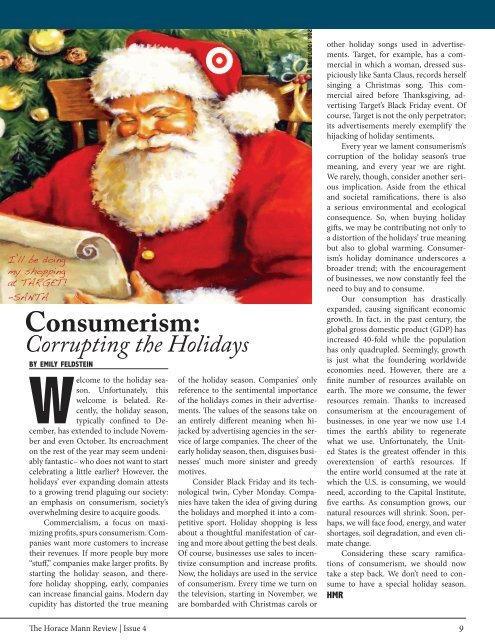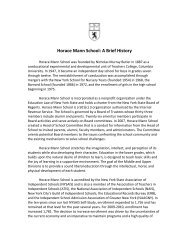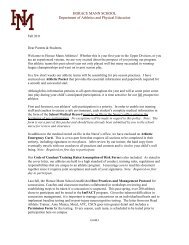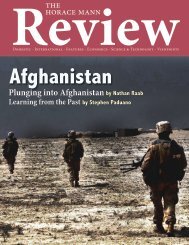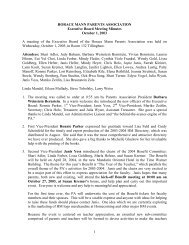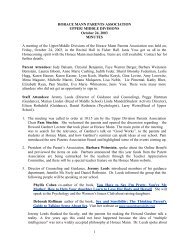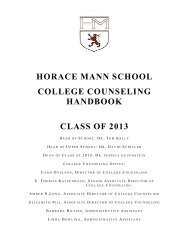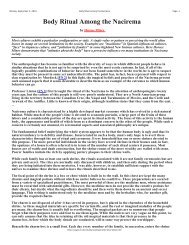Create successful ePaper yourself
Turn your PDF publications into a flip-book with our unique Google optimized e-Paper software.
<strong>Domestic</strong><br />
I’ll be doing<br />
my shopping<br />
at TARGET!<br />
-SANTA<br />
Consumerism:<br />
Corrupting the Holidays<br />
by emily feldstein<br />
Welcome to the holiday season.<br />
Unfortunately, this<br />
welcome is belated. Recently,<br />
the holiday season,<br />
typically confined to December,<br />
has extended to include November<br />
and even October. Its encroachment<br />
on the rest of the year may seem undeniably<br />
fantastic– who does not want to start<br />
celebrating a little earlier? However, the<br />
holidays’ ever expanding domain attests<br />
to a growing trend plaguing our society:<br />
an emphasis on consumerism, society’s<br />
overwhelming desire to acquire goods.<br />
Commercialism, a focus on maximizing<br />
profits, spurs consumerism. Companies<br />
want more customers to increase<br />
their revenues. If more people buy more<br />
“stuff,” companies make larger profits. By<br />
starting the holiday season, and therefore<br />
holiday shopping, early, companies<br />
can increase financial gains. Modern day<br />
cupidity has distorted the true meaning<br />
208.100.38.92<br />
of the holiday season. Companies’ only<br />
reference to the sentimental importance<br />
of the holidays comes in their advertisements.<br />
The values of the seasons take on<br />
an entirely different meaning when hijacked<br />
by advertising agencies in the service<br />
of large companies. The cheer of the<br />
early holiday season, then, disguises businesses’<br />
much more sinister and greedy<br />
motives.<br />
Consider Black Friday and its technological<br />
twin, Cyber Monday. Companies<br />
have taken the idea of giving during<br />
the holidays and morphed it into a competitive<br />
sport. Holiday shopping is less<br />
about a thoughtful manifestation of caring<br />
and more about getting the best deals.<br />
Of course, businesses use sales to incentivize<br />
consumption and increase profits.<br />
Now, the holidays are used in the service<br />
of consumerism. Every time we turn on<br />
the television, starting in November, we<br />
are bombarded with Christmas carols or<br />
other holiday songs used in advertisements.<br />
Target, for example, has a commercial<br />
in which a woman, dressed suspiciously<br />
like Santa Claus, records herself<br />
singing a Christmas song. <strong>This</strong> commercial<br />
aired before Thanksgiving, advertising<br />
Target’s Black Friday event. Of<br />
course, Target is not the only perpetrator;<br />
its advertisements merely exemplify the<br />
hijacking of holiday sentiments.<br />
Every year we lament consumerism’s<br />
corruption of the holiday season’s true<br />
meaning, and every year we are right.<br />
We rarely, though, consider another serious<br />
implication. Aside from the ethical<br />
and societal ramifications, there is also<br />
a serious environmental and ecological<br />
consequence. So, when buying holiday<br />
gifts, we may be contributing not only to<br />
a distortion of the holidays’ true meaning<br />
but also to global warming. Consumerism’s<br />
holiday dominance underscores a<br />
broader trend; with the encouragement<br />
of businesses, we now constantly feel the<br />
need to buy and to consume.<br />
Our consumption has drastically<br />
expanded, causing significant economic<br />
growth. In fact, in the past century, the<br />
global gross domestic product (GDP) has<br />
increased 40-fold while the population<br />
has only quadrupled. Seemingly, growth<br />
is just what the foundering worldwide<br />
economies need. However, there are a<br />
finite number of resources available on<br />
earth. The more we consume, the fewer<br />
resources remain. Thanks to increased<br />
consumerism at the encouragement of<br />
businesses, in one year we now use 1.4<br />
times the earth’s ability to regenerate<br />
what we use. Unfortunately, the United<br />
States is the greatest offender in this<br />
overextension of earth’s resources. If<br />
the entire world consumed at the rate at<br />
which the U.S. is consuming, we would<br />
need, according to the Capital Institute,<br />
five earths. As consumption grows, our<br />
natural resources will shrink. Soon, perhaps,<br />
we will face food, energy, and water<br />
shortages, soil degradation, and even climate<br />
change.<br />
Considering these scary ramifications<br />
of consumerism, we should now<br />
take a step back. We don’t need to consume<br />
to have a special holiday season.<br />
HMR<br />
The <strong>Horace</strong> <strong>Mann</strong> Review | Issue 4 9


